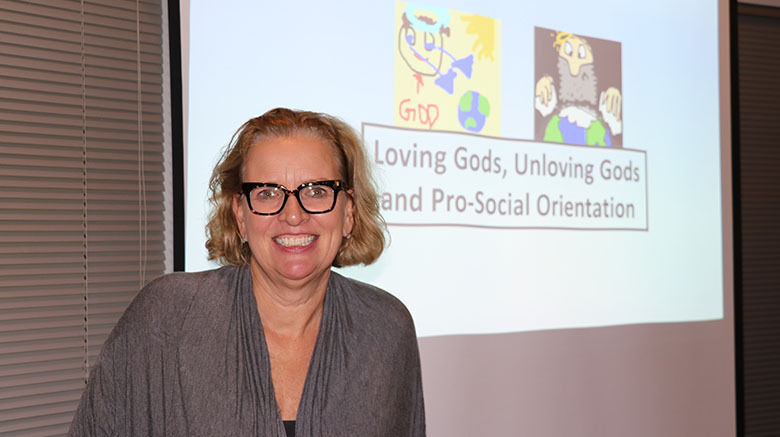An increasing number of Americans define themselves as spiritual, but not religious (according to recent findings by the Pew Research Center). The growth of “spiritual but not religious” Americans has come mainly at the expense of those who say they are religious and spiritual.
This trend begs the question, do we really need religion or God to be moral?
Working as SJC’s Department of Psychology Chair, Dominique Treboux, Ph.D., has spent a significant time discussing the meaning of spirituality with a god versus spirituality without a god.
Earlier this November, Dr. Treboux presented the Liberal Arts Colloquium “Loving Gods, Unloving Gods and Pro-Social Orientation.” The lecture addressed if and how we think about God or a higher power and our concern for others. Mainly, are those who are more religious necessarily more generous?
Psychology research is a hallmark of SJC. Students participate in the annual Undergraduate Research Symposium to present their work, with the help of full-time psychology faculty. As is typical in SJC Long Island, Dr. Treboux used her own students as research assistants in the attainment and processing of data.
Attachment is relevant to relationships across the lifespan. Children learn from their parents on their experiences of being comforting and learning how to take care of others. If we look at descriptions of God and descriptions of parental attributes we see the same kinds of words being used: Comforting, protecting and available.”
“Before coming to St. Joe’s, most of my work was centered on the influence of early attachment experiences on romantic relationships. Specifically, the ability to provide support and care for a partner, as well as the ability to seek comfort and care from one’s partner,” Dr. Treboux said.
In 2010, Dr. Treboux spoke at an honors convocation on spiritual values. She became very interested in the increasing number of people classified as spiritual but not religious, and the belief that one didn’t need religion or a god to be moral. For a while, Dr. Treboux and fellow faculty Tom Petriano, Ph.D., and Paul Ginnetty, Ph.D., worked on a variety of projects with/without belief of a higher power.
From there, Dr. Treboux integrated ideas from attachment to the study of spirituality.
“Attachment is relevant to relationships across the lifespan,” Dr. Treboux said. “Children learn from their parents on their experiences of being comforting and learning how to take care of others. If we look at descriptions of God and descriptions of parental attributes we see the same kinds of words being used: Comforting, protecting and available.”
Dr. Treboux used a variety of subjects across the country to measure how those would hypothetically share wealth depending on their alignment with spirituality and religion. The results? Those who viewed God favorably and those who viewed God unfavorably were almost identical in their generosity.
Now, Dr. Treboux is retooling her research for future subjects. Mainly, priming participants with favorable and unfavorable language about God, to see if a conditioned subject’s response will weigh more heavily.
“An obvious starting point for anyone looking to apply attachment theory to religion is the notion that an individual can have a personal relationship with God,” Dr. Treboux said. “Most believers will say they have a personal relationship with God. Just as children use their mothers as a safehaven, individuals turn to God, to serve their attachment needs. Within this view, we expect people who report good attachment experiences with their God are more likely to engage in pro social behaviors.”
Only time will tell if rising trends of “spiritual, but not religious” in Americans will overtake those who see themselves as religious.

